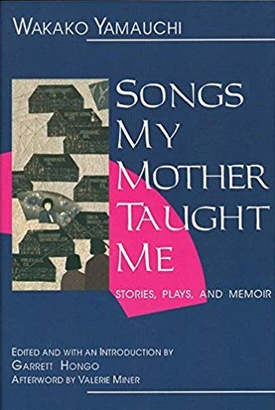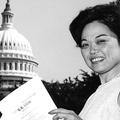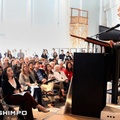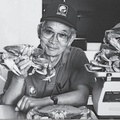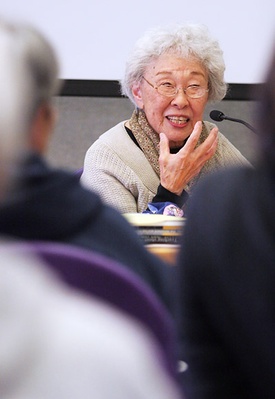
Wakako Yamauchi, a renowned Nisei writer best known for her play And the Soul Shall Dance, passed away on Aug. 16 at her home in Gardena, CA. She was 93.
She is remembered for depicting the struggles of Japanese immigrants and their children during the Great Depression and World War II, which she personally experienced.
Yamauchi, who was also a short-story writer, a poet, and a painter, published two books, Songs My Mother Taught Me: Stories, Plays, and Memoir” (1994) and Rosebud and Other Stories (2011).
She was born Wakako Nakamura on Oct. 24, 1924, in Westmorland to Issei parents who farmed in the Imperial Valley, near the Mexican border. As tenant farmers, they moved continuously with four children in tow, following work from town to town. During the Great Depression, her father was forced to begin farming for himself and her mother assisted him in the fields, but also taught Japanese on Sundays at the Buddhist church. Unable to make ends meet, they also opened a boarding house for other Japanese immigrants.
Pearl Harbor was bombed when Yamauchi was 17 years old. She recalled in an interview that her Nisei classmates stopped coming to school and one of her teachers condemned the “Japs” for attacking America. She and her family were incarcerated at the Poston concentration camp in Arizona. It was there that she got to know Nisei writer Hisaye Yamamoto, a few years her senior and already established in the Japanese American press.
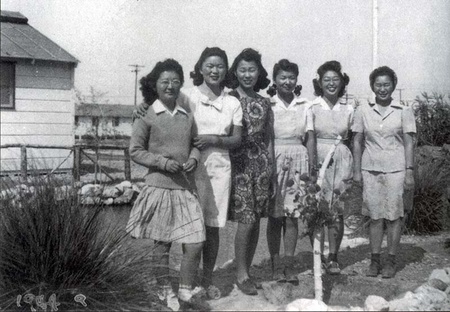
Yamauchi had enjoyed Yamamoto’s column in The Kashu Mainichi, written under the pen name Napoleon, and later recalled being disappointed when she found out Napoleon was a woman. Both women worked on the camp newspaper, The Poston Chronicle, as layout artist and contributing writer, and shared an interest in art and literature. Until Yamamoto’s passing in 2011 at age 89, the two maintained a close, life-long friendship of inspiration and artistic support.
After a year and a half at Poston, Yamauchi relocated to Utah and then to Chicago, where she worked in a candy factory and began attending plays, marking the beginning of her love for theater. In 1948, she married Chester Yamauchi (1923-1992). Although the couple later divorced, she continued to write under her married name.
Their daughter Joy, who served as editor of Tozai Times, a monthly newspaper founded by Chester, passed away in 2014 at age 58.
Returning to Los Angeles after the war, Yamauchi studied painting at the Otis Art Center and later took a correspondence course in short-story writing. Although she was better known as an artist, in 1960 she was asked by The Rafu Shimpo to contribute to its annual holiday edition and from that year on, she regularly penned a short story or essay for the newspaper.
An avid reader since childhood, Yamauchi has cited a variety of literary influences, including Henry Wadsworth Longfellow, Zane Grey, Thomas Wolfe, Tennessee Williams, and many of her fellow Asian American writers.
In 1974, a group of Asian American writers — led by Frank Chin, Jeffery Paul Chan, Lawson Fusao Inada, and Shawn Wong — organized a landmark anthology entitled “Aiiieeeee!,” which published Yamauchi’s short story And the Soul Shall Dance after Yamamoto suggested it for inclusion. Yamauchi’s stories appeared in a number of other anthologies, including Counterpoint: Perspectives on Asian America (1976), as well as the academic publication Amerasia Journal.
Her other stories include “The Boatmen on Toneh River,” “The Sensei,” and “Shirley Temple, Hotcha-cha.”
She recalled in an interview that “The Sensei,” which was about camp life, angered her Caucasian writing teacher. “She wanted the American pie finish, not a criticism of the Japanese American internment camps … But the story was my husband’s and I had to tell it the way it happened. I realized then that an acceptable philosophical and political point of view was important to mainstream publication, so I stopped trying for white publications and wrote for Rafu Shimpo … They knew what I was saying.”
East West Players Artistic Director Mako read And the Soul Shall Dance and convinced Yamauchi to turn it into a play, despite the fact that she had never written for the stage before. “So I sent my daughter to the Gardena Library for a book on how to write plays,” she told The Los Angeles Times.
The play was first performed at East West Players, winning the Los Angeles Drama Critics Circle Award for best new play of 1977 and receiving a favorable review from The L.A. Times’ Dan Sullivan. It told the story of two families, the Okas and the Muratas, farming in the Imperial Valley in the 1930s. The Okas have a troubled marriage and a dark past, and the wife longs to return to Japan. Theater historian Esther Kim Lee called it a “groundbreaking production [that] put the company on the map in the Los Angeles area.”
The following year, And the Soul Shall Dance was produced as a television drama for PBS station KCET in Los Angeles, featuring Haunani Minn, Yuki Shimoda, Denice Kumagai, Pat Li, Sab Shimono, and Diane Takei, all of whom had appeared in the stage version. The play continues to be performed across the country and has also been produced in Japan under the title Soshite Kokoro wa Odoru.
Yamauchi’s subsequent plays include 12-1-A (her family’s address at Poston), which is set in camp and is also widely performed; and The Chairman’s Wife, which is about Mao Zedong’s widow, Jiang Qing. Both are included in The Politics of Life: Four Plays by Asian American Women (1993), edited by Velina Hasu Houston. 12-1-A has also been produced in Japan.
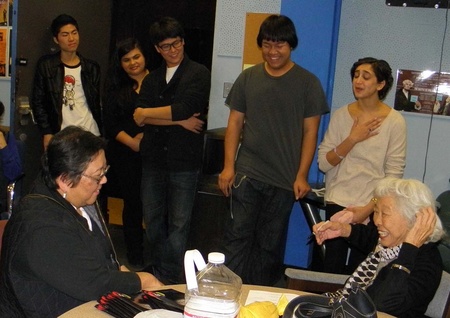
Yamauchi’s play The Music Lessons, which is about a single mother running a farm and her difficult relationship with her daughter, complicated by the arrival of a new farm hand, is based on her short story “In Heaven and Earth” and is included in Songs My Mother Taught Me along with And the Soul Shall Dance.
“Some of her best literary works explore how the experiences and aspirations of her generation, seen through a distinct Japanese American woman’s perspective, collide with obstacles of race and class discrimination,” wrote Patricia Wakida, editor of Only What We Could Carry: The Japanese American Internment Experience. “Yamauchi deftly draws from her life experiences and observations — of her immigrant parents and the tension between the two generations, the trauma of World War II, post-war resettlement and assimilation, and the process of aging — to create her art.
“Many of her stories depict Issei and Nisei women who grapple with the barriers of gender and ethnicity, while simultaneously resisting the patriarchal norms and the consequences of their self-expression and desire for independence.”
Yamauchi received numerous awards, including Rockefeller grants, the Brody Art Fund Fellowship, and the American Theater Critics Regional Award for Outstanding Play.
She is featured, along with textile artist Momo Nagano and singer Mary Nomura, in Words, Weavings & Songs, a 2002 documentary by John Esaki. Although all three were held behind barbed wire as teenagers, their creative spirits remained undaunted, their lives fortified by art, music, and literature.
As a member of Pacific Asian American Women Writers West, which was established in 1976, Yamauchi did several readings at community events. Other PAAWWW members have included Joyce Nako, Jude Narita, Miya Iwataki, Sue Kunitomi Embrey, Cecilia Manguerra Brainard, Amy Uyematsu, Emma Gee, Diane Ujiiye, Naomi Hirahara, Sumi Haru, Pamela Tom, Chungmi Kim, Momoko Iko, and Akemi Kikumura Yano.
As word of Yamauchi’s passing spread, many friends and associates posted remembrances on Facebook.
Garrett Hongo, Pulitzer-nominated poet and editor of Songs My Mother Taught Me: “My beloved kumu mele — teacher in life, art, and love for our history and people — has crossed the River of Stars. He manaʻo he aloha …”
Lillian Howan, author of The Charm Buyers and editor of Rosebud and Other Stories: “She possessed both a sharp, clear wit and bountiful compassion, an exceptional, rare artist who could express her vision both in words and in painting. I’m grief-stricken and fumbling for words to express my profound gratitude, respect, awe, and love for Wakako. Go forth, dear great soul.”
Karen Huie, who played the title role in The Chairman’s Wife: “Wakako Yamauchi was one of my dearest friends. Life was bewildering when I first arrived in L.A. I made the assumption I belonged to Asian American groups simply because I am Asian American. After a night of badgering by fellow Asian American women writers, Wakako came to my rescue and helped me understand I was attacked out of jealousy. We became lifelong friends.”
Chris Tashima, actor and Oscar-winning director of Visas and Virtue: “Plays (my first dramatic role), workshops, readings, a film that wasn’t completed … and more. Lucky to have shared part of the journey of many of her works. Always haunting and heart-wrenching, we are richer for her words.”
Not So Ancient, an Asian American Theatre History Podcast: “We are incredibly sad to hear about the recent passing of Wakako Yamauchi, one of several playwrights in the first wave of Asian American theatre. We are so honored to have recorded an episode of our podcast discussing her work, which will be available this Friday. It is important that we continue to remember her and her work in our field. R.I.P. Wakako. Thank you for all you’ve done for us.”
GENseng Geneseo (New York): “GENseng is sad to report that Wakako Yamauchi, who penned ‘And the Soul Shall Dance,’ a classic of Asian American playwriting, has passed away. GENseng was honored to produce the play in 2011. Yamauchi was a gracious and dignified lady of the theatre. We shall not see her like again.”
Survivors include Yamauchi’s grandchildren, Alyctra Matsushita (fiancé Peter Chisom) and Lucas Matsushita; son-in-law, Victor Matsushita; sister, Yukiko Sugiyama; and brother-in-law, Jay Takaya.
Note: Some biographical information provided by Densho and Encyclopedia.com.
* This article was originally published on The Rafu Shimpo on August 24, 2018.
© 2018 The Rafu Shimpo


